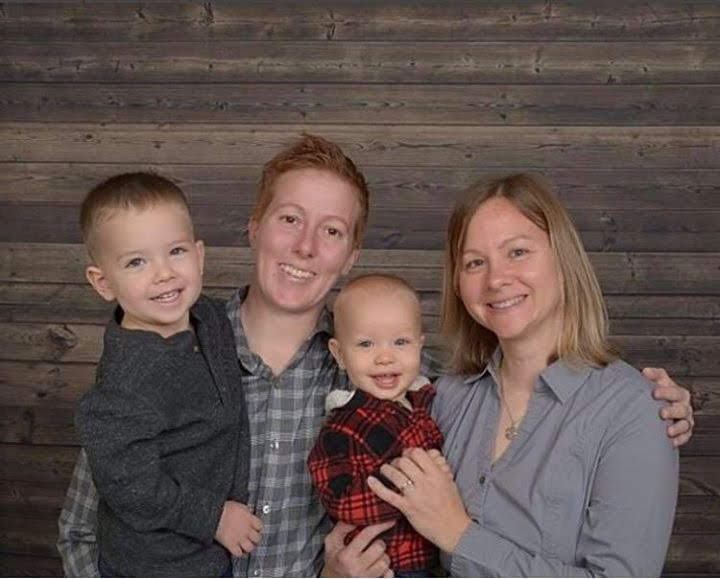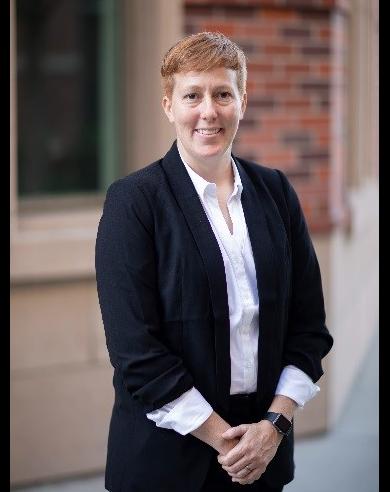Leader Spotlight: Pattie Adams
Our Leader Spotlight series highlights the diverse and dynamic veterans who make up VFAI. Today, we're highlighting Pattie Adams of Los Angeles, California.
Tell me about your military service.
From the age of five, I knew I wanted to be in the military and my dream was to fly fast planes. I have always been inspired and humbled by my family’s legacy of service. My maternal grandfather was a Petty Officer 2nd Class in the U.S. Navy during WWII and later served in the Air National Guard as an aircraft mechanic. He and I actually drove from Sacramento to my first duty station, Dover Air Force Base in Delaware, from Sacramento, CA. It was the best road trip of all time!
My paternal grandfather also served, but in the Army. He was a second-generation Jewish immigrant who fought in in WWII—although he never spoke of his time in uniform.
In high school I discovered you had to be an officer to become a pilot, which required a college degree, so I applied to the U.S. Air Force Academy. I did not get selected, but I was given the honor of an Air Force ROTC scholarship at California State University, Sacramento. I eventually was chosen for a pilot slot, but unfortunately was medically disqualified just before commissioning. Ultimately, I proudly wore the Air Force uniform, serving as a Security Forces Officer since January 2003.
I went into the Air Force Reserve in 2006 due to a reduction in forces (RIF) and relocated to Joint Base San Antonio, where I remained until 2014. During that time, I served in a variety of Security Forces roles and deployed to Kandahar, Afghanistan in support of Operation Enduring Freedom.
In 2016 I returned to active duty as an Air Force ROTC instructor and OTS instructor, but today I’m back to being a Traditional Reservist at March Air Reserve Base. I’m also a full-time graduate student at the University of Southern California Marshall School of Business, where I’m working on my Master of Business for Veterans.
How did your service shape the person you are today?
My service taught me how to overcome adversity, to be flexible and adapt to any challenge, and how to lead with both strength and compassion. I believe in complete dedication and ownership of the Air Force core values: “integrity first, service before self and excellence in all we do.” I believe these carry over into every aspect of your life, not just your military duties.
9/11 occurred while I was still a cadet in Air Force ROTC, so when I lost my pilot slot, I had to adjust my thinking to understand that true service wasn’t about getting to fly, nor was it about what the Air Force could provide to me, it was about what I was able and willing to give for my country and our way of life. I dedicated myself to doing the best I could in any opportunity I was provided, which shaped me into a genuinely resilient person.
As a veteran, what sort of responsibility do you feel to speak up on issues that relate to American ideals?
When I first entered the military, I was subject to the “Don’t Ask, Don’t Tell” policy. I am especially thankful I can now be my authentic self and proudly serve with my family by my side to support me. My wife and two sons strengthen my commitment to service and are the most significant part of my devotion to my country and our ideals of freedom and equality. I am encouraged by the progress our country has made over the last ten years.
Today, I see it as a continuation of my service to stand up for marginalized individuals. When I see people who are not being treated with dignity and respect, especially if they are fleeing persecution or violence, I believe it is our duty as a global leader to help them achieve safety.
I believe we have the capability to take better care of our communities, including veterans, children, the homeless, refugees, and other new Americans. These causes aren’t mutually exclusive—we just need ethical leadership, knowledge, and compassionate strategies to manage our resources effectively. We also need a larger community that believes in the shared value of “service before self.”

Photo: Pattie and family
Tell me about one issue related to those ideals that is of particular importance or concern to you right now. What are you doing about it?
My primary concern is character development in our youth, emphasizing respect for diversity and inclusion. Many people are not taught the complicated history of our country or how important it is to overcome that past, and the racism, xenophobia, homophobia, sexism, and bigotry it contains.
American children need quality leadership and character development to appreciate and act with inclusivity. John F. Kennedy said, “leadership and learning are indispensable to each other.”
Veterans for American Ideals allows me to take action, develop strategies, and continue my service through volunteer efforts at local elementary schools where I can educate students about American ideals such as truth, justice, and liberty. Character development also begins with a basic understanding of leadership and integrity.
What would you say to other veterans about the role that they can play in these issues as citizens?
To quote JFK again, “If not us, who? If not now, when?”
As veterans, we are acknowledged and respected among our fellow citizens. We know how to collaborate with people from all backgrounds. I believe these skills and experience make us uniquely positioned to lead and unite our communities.
Veterans also have the ability to set aside political and ideological differences, and remind Americans of our shared values enshrined in the Declaration of Independence and echoed in the Constitution. We swore an oath to defend these principles, one way we can do that is speaking their truths to those around us.
I hope to remind every veteran they have so much value and worth, and that we can continue our mission by uniting, leading, and serving our communities. If not for us, and the inherent pride it brings, then for the future generations. Our children deserve the best we can give them; a solid foundation of character, knowledge, and freedom.


